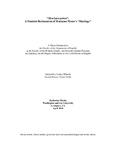| dc.rights.license | In Copyright | en_US |
| dc.creator | Monks, Katherine H. | |
| dc.date.accessioned | 2018-05-24T10:23:08Z | |
| dc.date.available | 2018-05-24T10:23:08Z | |
| dc.date.created | 2018 | |
| dc.identifier | WLURG38_Monks_ENGL_2018 | |
| dc.identifier.uri | http://hdl.handle.net/11021/34125 | |
| dc.description | Thesis; [FULL-TEXT FREELY AVAILABLE ONLINE] | en_US |
| dc.description | Katherine H. Monks is a member of the Class of 2018 of Washington and Lee University. | en_US |
| dc.description.abstract | I began and ended my research with "Marriage" itself in the same way that this thesis begins and ends with the poem itself. From here I naturally moved to understand Marianne Moore, hoping that through knowing Moore's background I would be able to elucidate the poetic and personal context in which she wrote. Through Charles Molesworth's biography Marianne Moore: A Literary Life and Linda Leavall's 2014 seminal work Holding On, Upside Down, supplemented by my archival research at the Rosenbach Museum, Moore's life began to unfold. My first chapter, "Moore's Many Marriages," examines the biographical details of Moore's life leading up to and during her writing of "Marriage." The understanding of the relationships in her life-- in particular her mother, brother, and editor -- help guide my close reading of the poem. Chapter Two, "Serpentine Answers to Flawed Questions," then unfolds in two sections that reflect my research methodology. The first is an interrogation of the macro aspects of the poem as well as the scholarship surrounding the poem. After first walking through the concepts of collage, the epithalamium form, and the overarching themes in the first section, the second section turns to a close reading of "Marriage" supplemented by Moore's notes from Observations and scholars' interpretations of the poem. Finally, in my coda, "The Female Poet, Feminism, and Moore," I conclude that Moore's poem ends on a feminist note and I reclaim her as a feminist poet using first, second, and third-wave definitions of feminism, arguing that Marianne Moore should be re-added to the annals of American poetry in her rightful position among not only the first ranks of female poets but, in poet John Ashbery's words, "our greatest modern poet" (Leavall 380). [From introductory section] | en_US |
| dc.description.statementofresponsibility | Katherine Monks | |
| dc.format.extent | 110 pages | en_US |
| dc.language.iso | en_US | en_US |
| dc.rights | This material is made available for use in research, teaching, and private study, pursuant to U.S. Copyright law. The user assumes full responsibility for any use of the materials, including but not limited to, infringement of copyright and publication rights of reproduced materials. Any materials used should be fully credited with the source. | en_US |
| dc.rights.uri | http://rightsstatements.org/vocab/InC/1.0/ | en_US |
| dc.subject.other | Washington and Lee University -- Honors in English | en_US |
| dc.title | "Men have power": A Feminist Reclamation of Marianne Moore's "Marriage" (thesis) | en_US |
| dc.type | Text | en_US |
| dcterms.isPartOf | RG38 - Student Papers | |
| dc.rights.holder | Monks, Katherine H. | |
| dc.subject.fast | Moore, Marianne, 1887-1972 | en_US |
| dc.subject.fast | Criticism, interpretation, etc. | en_US |
| dc.subject.fast | Feminism and literature | en_US |
| local.department | English | en_US |
| local.scholarshiptype | Honors Thesis | en_US |
